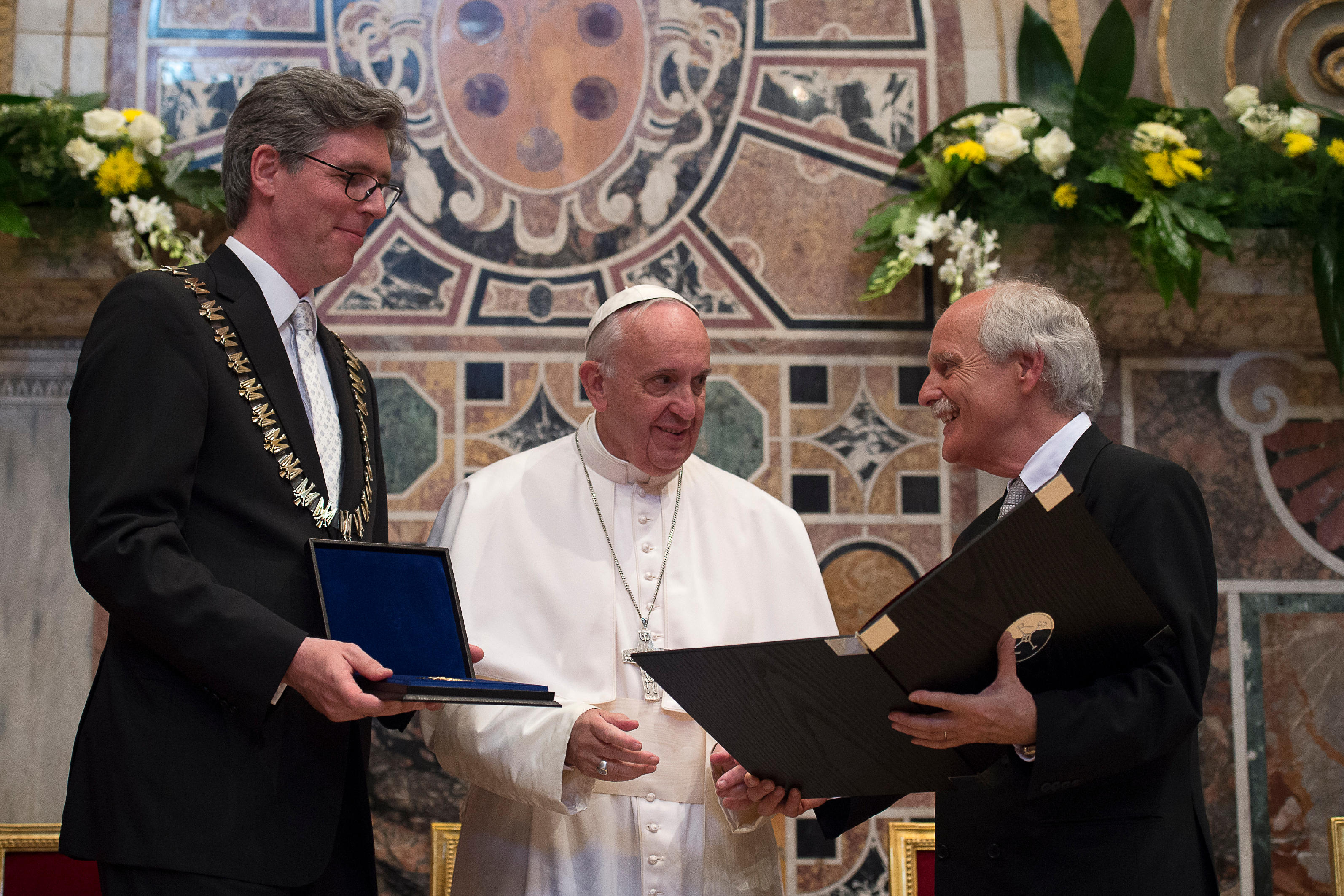History and Future
In the speech delivered on the occasion of the conferral of the Charlemagne Prize, Pope Francis voiced his “dream of a Europe based on solidarity, cohesive and open.” This position is in continuity with that of his predecessors, starting with Pius XII. The essential mission of the Church: to contribute to the rebirth of a “weary”, aged Europe, by bringing “the pure water of the Gospel”

Upon the conferral of the Charlemagne Prize, in recognition of his contribution to European unity, past May 6, Pope Francis delivered an important acceptance speech in the Vatican, dedicated to Europe. For the Holy Father it was an opportunity to exhort Europe, although on previous occasions Bergoglio said that Europe appeared as an elderly, haggard “grandmother”, closed in on herself. Thus Bergoglio spurred Europe to act: “What has happened to you, the Europe of humanism, the champion of human rights, democracy and freedom? What has happened to you, Europe, the home of poets, philosophers, artists, musicians, and men and women of letters? What has happened to you, Europe, the mother of peoples and nations, the mother of great men and women who upheld, and even sacrificed their lives for, the dignity of their brothers and sisters?” The Pope highlighted the chasm separating the intuitions of Europe’s founding fathers – notably Robert Schuman, Konrad Adenauer and Alcide De Gasperi, whom he mentioned several times, describing them as the “heralds of peace and prophets of the future – from our present times.
For the Pontiff their message and their concrete achievements bear significant topical relevance
Thereby enabling us to “update the idea of Europe”. A Europe “capable of giving birth to a new humanism based on three capacities: the capacity to integrate, the capacity for dialogue and the capacity to generate.”
It involves responding to the challenge of renewing Europe’s traditions of humanism. Pope Francis urges us to reflect on the roots of Europe, defined as a “family of peoples”, the same expression used in his speech at the European Parliament in Strasbourg in 2014. In his speech, the Pope does not focus on the “Christian roots” of Europe, a theme that was dear to John Paul II. He deliberately does not use this expression in order to highlight the cultural diversity of Europe. He said: “The roots of our peoples, the roots of Europe, were consolidated down the centuries by the constant need to integrate in new syntheses the most varied and discrete cultures. The identity of Europe is, and always has been, a dynamic and multicultural identity.” But the Church has a mission: to contribute to the “rebirth of a weary Europe”, to bring back the pure water of the Gospel to the roots of Europe.”
The future of Europe is rooted in dialogue, in the ability “to become a model of new syntheses and of dialogue”, through openness and through the encounter of peoples and civilizations.
The concrete implementation of this vision requires the contribution and the mobilization of young people who are presently suffering the consequences of unemployment, precariousness, underemployment. The Pope returned to criticize liberalism and international finance, as expressed in the encyclical Laudato sí and in his speech to the world meeting of Popular Movements in Santa Cruz de la Sierra, Bolivia, July 9 2015. He called for the implementation of a balanced economic system, comparable to the “social market economy” pursued in the 1950s on the initiative of German Christian Democrats, notably by Ludwig Erhard. In keeping with the social doctrine of the Church, the Pope urged to “pass from an economy directed at revenue, profiting from speculation and lending at interest, to a social economy that invests in persons by creating jobs and providing training.” Francis concluded his speech before the promoters of the Charlemagne Prize and numerous personalities in the realm of European politics, diplomacy and culture, with a dream, (reflecting, although not explicitly mentioned, the model of Martin Luther King): “I dream of a new European humanism”, a Europe that respects life, that offers help to the poor, that welcomes those who “have lost everything and need shelter”, that is concerned for the elderly, where young people and families have a role, “that promotes and protects the rights of everyone, without neglecting its duties towards all.” With this speech Pope Francis is in continuity with his predecessors, who, starting with Pius XII, expressed their support for the construction of a united Europe. In the post-war years, and in the period of the Cold War, unity was seen as an underlying requirement to prevent new totalitarian and warmongering drives, a prerequisite for the development of democracy and peace.
Peace and solidarity were then the primary goals of the European Union. They remain the goals of the Church today.
Francis reaffirms this heritage. But through his definition of the identity of Europe grounded in her various cultures – where the Church must fully carry out her evangelizing role in a spirit of service – and based on a Europe understood as a family of peoples (without using the term State), the Holy Father ushers in new paths enabling us to face a time of storms. There remains to know whether his audience, European leaders at the highest political level, will take these words to heart in the framework of their concrete responsibilities.